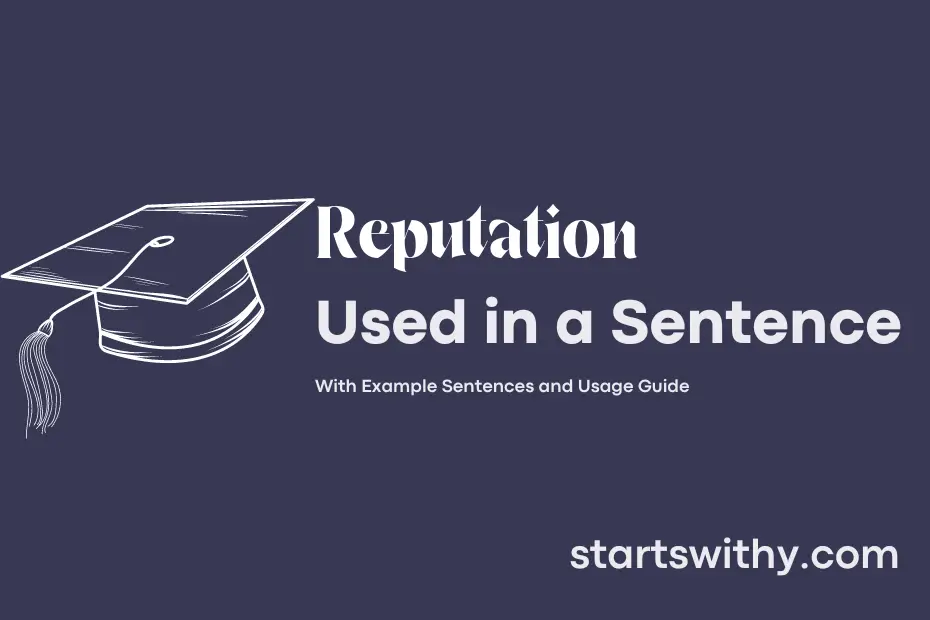“Reputation” refers to the beliefs or opinions that are generally held about someone or something. It is essentially the public perception of a person, organization, or even a product. A good reputation can pave the way for success, while a tarnished one can bring about negative consequences.
In today’s interconnected world, reputation management has become increasingly crucial for individuals and businesses alike. With the power of social media and online reviews, one negative comment can quickly damage a reputation. Understanding how to build, maintain, and repair a reputation is key to navigating the competitive landscape of the modern age.
7 Examples Of Reputation Used In a Sentence For Kids
- People talk about reputation when they say good things about you.
- Being honest and kind can help you build a good reputation.
- It’s important to always try your best to maintain a positive reputation.
- Your actions and words can affect your reputation with others.
- Treat others with respect to have a good reputation.
- Always think before you speak so you don’t damage your reputation.
- Having a good reputation means people trust and respect you.
14 Sentences with Reputation Examples
- Reputation is key when applying for internships or job opportunities.
- College students should be mindful of how their actions can impact their reputation within the academic community.
- Maintaining a good reputation among professors can lead to strong recommendations for further studies or career prospects.
- It’s important to uphold a positive reputation on social media platforms to avoid any potential backlash.
- Group projects can greatly affect your reputation among peers, so it’s crucial to communicate and collaborate effectively.
- Academic dishonesty can irreparably damage a student’s reputation within the college and professional circles.
- Joining clubs and organizations is a great way to build a positive reputation and expand your network.
- Attending industry talks and seminars can help enhance your reputation among professionals in your field.
- Taking on leadership roles in college can boost your reputation and demonstrate valuable skills to potential employers.
- Seeking feedback from professors can provide valuable insights on how to improve and strengthen your academic reputation.
- Building a strong reputation for being reliable and responsible can lead to exciting opportunities for personal growth and development.
- Participating in community service projects can enhance your reputation as a socially conscious and empathetic individual.
- Fostering positive relationships with classmates can contribute to a supportive and collaborative reputation within the college community.
- A strong reputation for academic excellence can open doors to research opportunities, scholarships, and prestigious graduate programs.
How To Use Reputation in Sentences?
Reputation refers to the beliefs or opinions that are generally held about someone or something based on their behavior, character, or previous actions.
To use Reputation in a sentence, start by identifying the person or thing you want to refer to. For example, you could say, “The company’s reputation for producing high-quality products has made it a trusted brand in the industry.” In this sentence, reputation is used to highlight the positive opinions that people have about the company based on its track record of delivering top-notch products.
When using Reputation in a sentence, it’s important to consider the context in which you are talking about someone’s or something’s standing in the eyes of others. For instance, you could say, “Her reputation as a reliable employee was well-deserved, as she always completed her tasks on time with high quality.” Here, reputation is used to emphasize the perception others have of the employee’s work ethic and reliability.
In summary, when incorporating Reputation into a sentence, remember to focus on the general beliefs or opinions that people have about someone or something based on past actions or behavior. By using Reputation effectively, you can communicate the standing or perception of a person, brand, or entity in a clear and concise manner.
Conclusion
In conclusion, the way in which individuals use sentences containing the keyword “reputation” reflects the importance placed on perceptions and beliefs about someone or something. These sentences often highlight the significance of maintaining a positive reputation in various contexts, whether in personal relationships, professional settings, or public image. Negative sentences involving “reputation” serve as warnings about the consequences of damaging one’s reputation and the challenges of rebuilding it once tarnished.
Overall, sentences featuring “reputation” emphasize the role reputation plays in shaping how others view individuals or entities, underscoring the need for mindful behavior and ethical practices to uphold a favorable reputation. It is clear that in language use, the keyword “reputation” carries weight in conveying the impact of one’s actions and decisions on how they are perceived by others.



